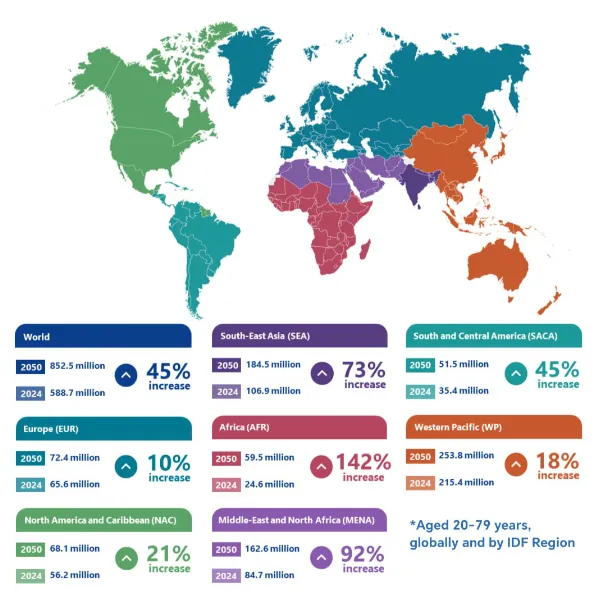
Every year on November 14, people around the world observe World Diabetes Day. This special day raises awareness about diabetes, a condition that affects millions of people globally. It highlights the importance of prevention, early diagnosis and proper care. Each year, the World Diabetes Day campaign focuses on a specific theme. In 2025, the focus is “Diabetes and Well-Being”, with a special emphasis on the challenges faced by people living with diabetes in the workplace. This initiative encourages collective action to create supportive environments that promote health, dignity and productivity for those living with diabetes.
History of World Diabetes Day
World Diabetes Day was first established in 1991 by the International Diabetes Federation (IDF) in collaboration with the World Health Organization (WHO). The day was created to raise awareness about the growing threats posed by diabetes to public health and economies around the world.
The date, November 14, was chosen to honor the birthday of Sir Frederick Banting, who, along with Charles Best, discovered insulin in 1922. This discovery revolutionized diabetes treatment and has saved millions of lives. The recognition of this day by the United Nations in 2006 further strengthened its global significance, making it an official day to focus on diabetes awareness, prevention and care.
World Diabetes Day has since become a platform to educate people about diabetes, encourage healthier lifestyles and promote supportive policies that make life easier for those affected by this condition.

Understanding Diabetes and Its Global Impact
Diabetes is a chronic health condition that occurs when the body cannot properly produce or use insulin, a hormone that regulates blood sugar levels. There are several types of diabetes, with Type 1, Type 2 and gestational diabetes being the most common. Type 1 diabetes usually develops in childhood or adolescence and requires insulin therapy for life. Type 2 diabetes often develops in adulthood, primarily due to lifestyle factors, although genetics also play a role.

According to the International Diabetes Federation:
- In 2021, approximately 537 million adults were living with diabetes worldwide.
- By 2030, this number is expected to rise to 643 million and by 2045, it could reach 783 million.
- Around 70% of people with diabetes are of working age, which emphasizes the impact of the condition on the workforce.
- Nearly three-quarters of people with diabetes experience mental health challenges, including anxiety and depression.
These figures show that diabetes is not only a medical condition but also a social and economic concern. It affects individuals’ ability to work, their mental health and their overall quality of life. World Diabetes Day 2025 highlights these issues and calls for action, particularly in the workplace.
Theme 2025: Diabetes and Well-Being
The theme for World Diabetes Day 2025 is “Diabetes and Well-Being”. This theme emphasizes the importance of holistic care, focusing not only on controlling blood sugar levels but also on promoting physical, mental and social health. The 2025 theme specifically addresses the workplace, encouraging employers and colleagues to create environments that are supportive and inclusive of individuals living with diabetes.
The slogan “Know More and Do More for Diabetes at Work” highlights the need for understanding, empathy and actionable support for employees with diabetes. By focusing on the workplace, this theme recognizes that people spend a significant portion of their lives at work and supportive policies can make a meaningful difference in managing diabetes effectively.

Challenges Faced by People with Diabetes in the Workplace
Despite growing awareness, individuals with diabetes often face significant challenges in the workplace. These challenges affect their health, well-being and productivity.

1. Stigma and Discrimination: Many people with diabetes face stigma and discrimination at work. Colleagues or supervisors may have misconceptions about the condition, assuming that employees with diabetes are less capable or need frequent breaks. This stigma can lead to exclusion, bullying or unfair treatment, negatively affecting mental health and work performance.
2. Lack of Supportive Policies: Some workplaces do not have policies that accommodate the unique needs of employees with diabetes. This includes lack of access to healthy meals, flexible breaks for insulin administration or spaces for glucose monitoring. Without these accommodations, employees may struggle to manage their condition effectively.
3. Limited Access to Healthcare Resources: In many regions, access to diabetes care and resources is limited. Employees may not have the ability to visit doctors during work hours or may lack insurance coverage for medications and supplies. This lack of access makes it challenging to maintain consistent management of the condition.
Addressing these challenges requires awareness, education and proactive measures from employers and society as a whole.
Importance of Well-Being for People with Diabetes
Managing diabetes involves much more than monitoring blood sugar levels. True well-being for people with diabetes includes physical, mental and social health. World Diabetes Day 2025 emphasizes this holistic approach.

Physical Health
Maintaining physical health is essential for effective diabetes management. Key practices include:
- Regular monitoring of blood glucose levels to maintain stability.
- Healthy diet rich in fiber, vegetables and whole grains while avoiding excessive sugar and processed foods.
- Regular physical activity, such as walking, cycling or yoga, which helps regulate blood sugar and improve cardiovascular health.
Mental Health
Living with diabetes can be mentally and emotionally challenging. Stress, anxiety and depression are common. Supporting mental health is vital for overall well-being. Strategies include:
- Counseling or therapy for emotional support.
- Stress management techniques, such as meditation, mindfulness or deep breathing exercises.
- Workplace support groups where employees can share experiences and advice.


Social Support
A strong social network enhances resilience and provides encouragement for managing diabetes. Social well-being can be promoted by:
- Family and friends who offer support and understanding.
- Community groups that provide education and resources.
- Employer initiatives that encourage inclusion and understanding among colleagues.
How Individuals and Organizations Can Participate in World Diabetes Day 2025
World Diabetes Day 2025 is not only about raising awareness but also about taking action. Both individuals and organizations can contribute to creating supportive environments.

Organize Awareness Events: Community events, seminars and workshops can educate people about diabetes. Local health screenings and educational campaigns help spread knowledge about prevention, early detection and proper management.
Support Policy Change: Employees and advocacy groups can encourage workplaces to adopt diabetes-friendly policies. This includes flexible breaks, healthy meal options, access to healthcare and educational programs for colleagues.
Share Your Story: Social media is a powerful tool for raising awareness. Individuals living with diabetes can share their personal stories, challenges and successes. This not only educates the public but also inspires others living with the condition.
Support Research: Contributing to or participating in research initiatives helps improve diabetes treatment and care. Organizations can fund research projects, while individuals can join studies that aim to develop better therapies, tools and resources.
Awareness Strategies for World Diabetes Day 2025
Raising awareness is key to the success of World Diabetes Day 2025. Strategies include:
- Educational campaigns in schools, offices and public spaces.
- Media coverage through television, newspapers and social media platforms.
- Health challenges and competitions to promote healthy living.
- Partnerships with NGOs and health organizations to reach a larger audience.
The goal is to create a culture of understanding and support for people living with diabetes, ensuring they can thrive both personally and professionally.


Role of Governments and Policymakers
Governments play a critical role in creating a diabetes-friendly environment. Policies can include:
- Access to affordable medications and insulin.
- Health insurance coverage for diabetes management.
- Regulations promoting workplace inclusivity for people with chronic illnesses.
By implementing these policies, governments can reduce the social and economic burden of diabetes while improving the quality of life for millions.
World Diabetes Day 2024 Videos
Conclusion
World Diabetes Day 2025 is more than a day of awareness. It is a call to action. By focusing on Diabetes and Well-Being, particularly in the workplace, the day encourages collective responsibility to create inclusive environments that support the physical, mental and social health of people living with diabetes.
Employers, colleagues, policymakers and communities must work together to remove stigma, provide access to care and foster supportive policies. Individuals can participate by educating themselves, sharing stories, supporting research and practicing healthy habits.
Together, we can ensure that people with diabetes can live well, work confidently and achieve their full potential. This World Diabetes Day, let’s commit to knowledge, empathy and action. The health and well-being of millions depend on it.




